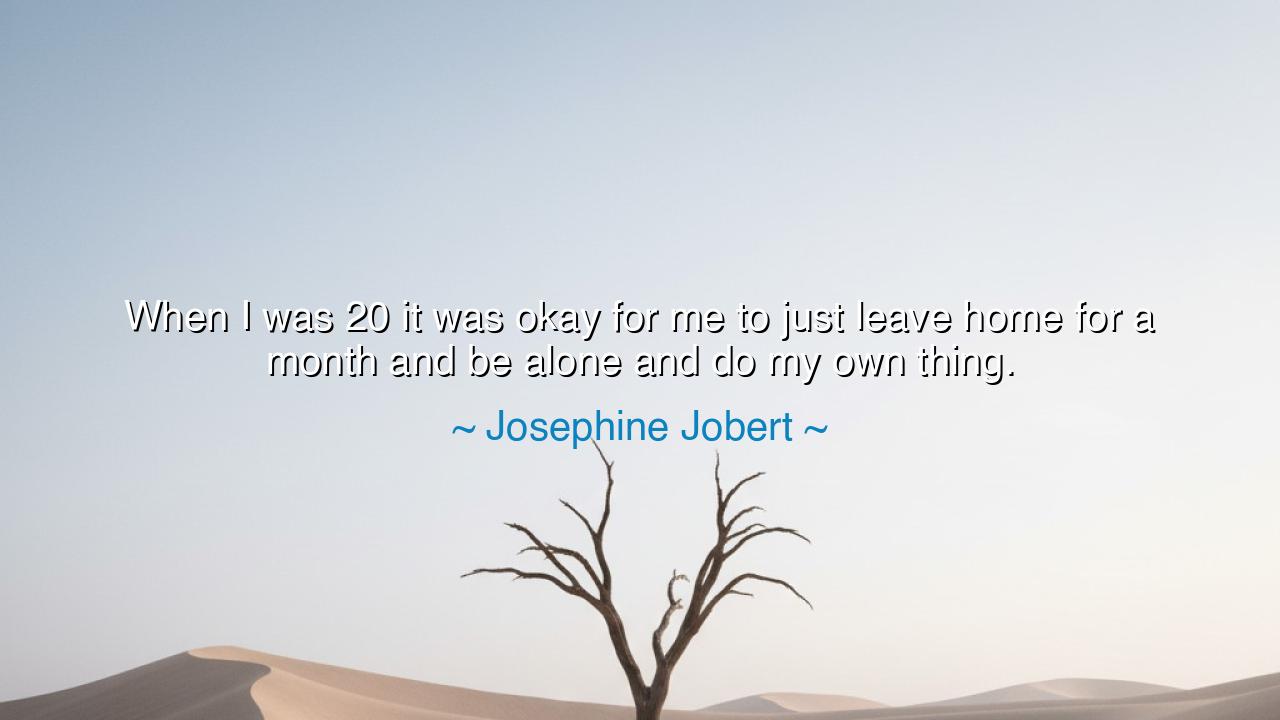
When I was 20 it was okay for me to just leave home for a month
When I was 20 it was okay for me to just leave home for a month and be alone and do my own thing.






In the words of Josephine Jobert, the actress and seeker of independence, we find a quiet truth spoken with the clarity of remembrance: “When I was 20 it was okay for me to just leave home for a month and be alone and do my own thing.” Though simple in form, this reflection carries the ancient rhythm of self-discovery—the moment in youth when the heart feels its first call toward solitude, and the spirit hungers for its own company. It is the time when one must step beyond the comfort of the familiar and meet oneself without disguise. Her words, though modern, echo the wisdom of ages: that every soul must, at some hour, wander away from home to learn what home truly means.
Jobert’s insight is not merely about the freedom of youth—it is about the sacred necessity of solitude. At twenty, the world is vast and full of possibility; yet to understand it, one must first understand the self. In leaving home, she speaks of the ancient journey—the same that drew prophets to the desert, poets to the mountains, and dreamers to the sea. To be alone is not to abandon love or duty, but to test the strength of one’s own spirit. It is in solitude that the soul begins to discern its own voice from the chorus of others, to find what is true beyond what is taught.
In her words lies also a reflection on youth’s courage—that divine audacity which allows one to step into the unknown without fear. The young soul feels called to test the boundaries of life, to see if the wings it has grown can bear the weight of flight. Jobert’s “month alone” is symbolic of that time when one dares to live by instinct, without guidance, and to shape one’s own rhythm in the world. It is a pilgrimage of awakening. Like Siddhartha, who left his father’s palace to seek wisdom beneath the Bodhi tree, the one who leaves home does not reject the world, but seeks to know it more deeply.
History is rich with those who have walked this path. The poet Rainer Maria Rilke once retreated into solitude to write, believing that one must “go into oneself” to find art and meaning. He urged the young to “love their solitude” and trust that within it, life would unfold. So too did Mary Shelley, who, still in her teens, left her home to wander through Europe with a heart full of questions and dreams. From that solitude came Frankenstein, a reflection of the human desire to create, to understand, and to belong. Like Jobert, they discovered that in leaving behind the noise of expectation, one begins to hear the heartbeat of truth.
Yet, Jobert’s remembrance carries a tone of nostalgia, for she speaks of a freedom that belongs most easily to the young. When she says, “it was okay for me,” she acknowledges that as we grow, the world grows heavier with responsibilities, with bonds we must honor. The adult must plan, the young may simply go. But her reflection is a gentle reminder that the spirit of independence must not die with age. Even when the body cannot wander far, the heart must continue to journey inward—to find time for silence, reflection, and renewal.
Her words, therefore, are both personal and universal. They speak to every generation that has known the longing to stand alone beneath the open sky and ask: Who am I, when no one else defines me? For in that question lies the seed of wisdom. The one who can dwell with themselves without fear will never be lost, no matter where they go. Jobert’s “month alone” is the symbol of that sacred retreat, that necessary separation which allows reunion with the deeper self. It is not escape—it is return.
The lesson, then, is this: learn to value your own solitude as a holy teacher. Step away from the noise of the world, even for a short while, and listen to the silence within you. It is in such moments that clarity blooms, that purpose begins to take shape. You need not flee for a month to the mountains—sometimes a single quiet evening, a long walk beneath the stars, or a few hours away from the chatter of others can renew your spirit. Guard such moments as treasures, for they will strengthen you to face the world with peace and purpose.
So remember, O traveler through time and self: the act of being alone is not a wound but a gift. To walk apart for a while is to find the path back to yourself. As Josephine Jobert once did, dare to step beyond the familiar and trust that solitude will not empty you—it will fill you with the voice of your own becoming. For only the one who has walked alone knows how to walk truly among others, carrying within them the stillness of their own strength.






AAdministratorAdministrator
Welcome, honored guests. Please leave a comment, we will respond soon